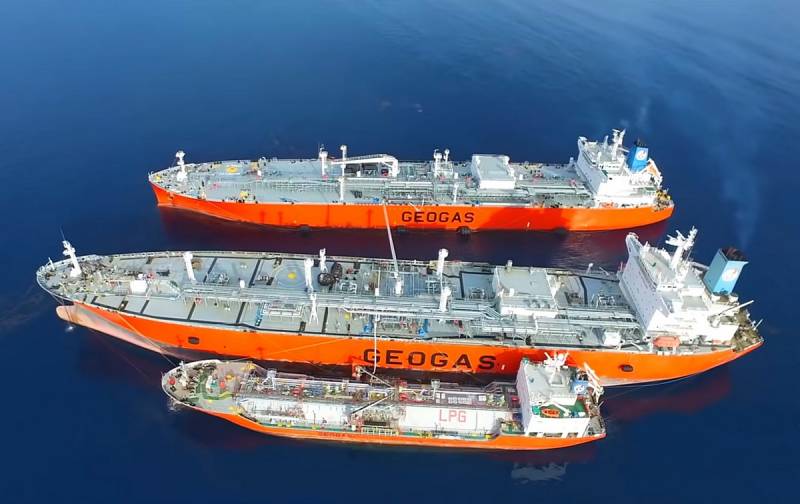Europe may replace Nord Stream with African gas
As expected, the Maidan of 2014 in Kyiv, hosted by the US Democratic Party, ultimately led not only to a large-scale war between Russia and Ukraine, but also to a rupture of relations between the EU and our country in the field of economics, trade and energy. Now Europe, not wanting to be totally dependent on "democratic" LNG from the United States, is desperately looking for alternative sources of gas supplies. And it looks like she already has.
Africa will help them
According to media reports, against the backdrop of an actively developing armed conflict on the territory of Ukraine and the principled refusal of the EU from Russian energy carriers, three African countries - Nigeria, Niger and Algeria - have returned to a substantive discussion of the possibility of building a Trans-Saharan gas pipeline. On July 29, a memorandum of understanding was signed, which provides for the resumption of work on this ambitious project. According to some estimates, this MHL may be put into operation in 3 years. Why didn't this happen before?
The idea of laying a main pipeline to Southern Europe through almost half of Africa arose back in the seventies of the last century. Detailed study of the project began in the 30s. It was assumed that the MHL would pass from the fields of Nigeria through the Niger to Algeria, and there along the bottom of the Mediterranean Sea it would enter the territory of the European Union. It was originally planned that the end point would be Spain, but now we are talking about Italy. The capacity of the Trans-African gas pipeline can reach XNUMX billion cubic meters per year.
For understanding: the total natural gas reserves in Nigeria are estimated at 5,8 trillion cubic meters, there is reason to expect their increase to 17,3 trillion cubic meters in the event of successful exploration. Algeria's proven gas reserves are 4,5 trillion cubic meters. Due to its geographical position, Algeria is so far the largest African exporter of blue fuel to the European market and the third largest after Russia and Norway. If the project is implemented, distant Nigeria may bite off Gazprom's share. The role of Algeria in the world energy market will also significantly increase, which can liquefy Nigerian gas at its own LNG plants located on the Mediterranean coast and send it for export by tankers to anywhere in the world.
For the Russian federal budget, all this does not sound too optimistic. However, the implementation of such a large-scale project may face a number of serious difficulties.
At first, the total length of the main gas pipeline is large, which should be more than 4,4 thousand kilometers, and hence its cost. The length of the pipe passing through the territory of Nigeria will be 1037 kilometers, through Niger - 841 kilometers, through Algeria - 2303 kilometers. Plus, 220 kilometers of an underwater gas pipeline to Spain should be added to this, if this route is nevertheless chosen. Construction was originally estimated at 10 billion dollars, now the price has increased to 13 billion.
Secondly, the big problem is the issue of security. The Sahara is a very turbulent place, where various radical and terrorist groups are active. Blackmail and extortion from the operating company can become a very attractive “feeding trough” for such structures.
Why did Nigeria, Niger and Algeria still return to the idea of building the Trans-Sahara gas pipeline?
Because Europe has made a fundamental decision to abandon Gazprom's products, and gas prices on the European market will definitely never be low. Algerian Energy Minister Arkab described the current situation as follows:
The launch of the TSGP project comes at a unique time both in terms of the geopolitical landscape and energy markets, characterized by high demand for gas and oil and supply stagnation caused by falling investment, especially in oil and gas exploration, since 2015.
As you can see, market conditions are favorable, and Europe is extremely determined to diversify energy supplies. Surely she will also help with investing in the Trans-Sahara gas pipeline. If necessary, security issues will also be collectively resolved by MPGs: they will conduct a joint military operation, declassing local radicals, and then hire PMCs for protection. Everything is solved, there would be a desire. And it is.
The unique international situation makes the pipeline project from Nigeria directly to Morocco (NMGP) quite realistic and seemingly fantastic. The problem with transit countries can be easily solved by their absence. The main pipeline will run along the seabed, bypassing the coast of West Africa. Its length will then be 5660 kilometers, capacity - 30 billion cubic meters per year, and the cost of construction - 25 billion dollars. Expensive?
Expensive! But the question has long since passed from the economic plane into political. 30 billion cubic meters plus another 30 is more than our entire Nord Stream.

Information